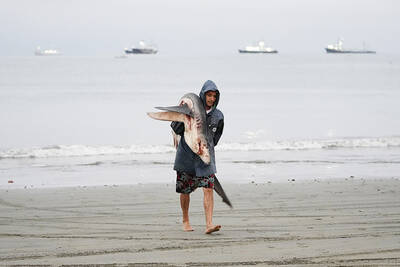Cuban President Raul Castro has told his compatriots to expect more hard times, but failed to usher in more reforms that many Cubans had been hoping for.
The speech marking the 55th anniversary of the start of the communist revolution led by his brother and former president Fidel Castro, came on Saturday, two years after Fidel’s last public appearance.
“We’re still short of many things we would like our people to enjoy ... but no matter how hard we wish to resolve each problem, we can’t spend more than what we have,” Raul, 77, told an estimated crowd of 10,000.
His speech, an echo of his address to lawmakers earlier this month, was given at the Moncada barracks — today a learning center — from where he and his brother Fidel launched the communist revolution in 1953 that six years later would sit them in power.
“We will continue to focus on defense, independently from the results of the US presidential elections,” he said, referring to Cuba’s neighbor and arch-enemy who is watchful of all Raul Castro’s steps since he formally took Cuba’s helm in February.
Standing under a huge portrait of his 82-year-old brother, Raul Castro announced that Cuba will hold its “Bastion 2008” military exercises “with the utmost quality and rigor” in November to coincide with the US presidential election.
“Preparations to defend the country are going well,” said Castro, who until February had been Cuba’s top general for nearly 50 years.
“At the same time,” he said, “the engineering adaptation of the military operations theater, the updating of weapons and other military hardware, as well as the promotion and training of officers has been continuing.”
He announced that this city, Cuba’s second-largest, will kick off the 50th anniversary of Cuba’s revolution — when Fidel Castro took office — on Jan. 1, and dedicated Saturday’s celebrations to his brother Fidel.
The speech included few hints that after more than half a century of hardline socialist policies, the regime was embracing a broader market-oriented shift in the footsteps of fellow socialist states China and Vietnam.
As in his July 11 speech to parliament, Raul Castro warned of hard times ahead, telling Cubans that “to draw maximum benefit” from our existing resources “we need to save on everything,” especially fuel, in light of spiraling crude oil prices.
“We don’t expect a unanimous response, which is usually fictitious. We must in a timely fashion explain to our people the difficulties so they can be handled. We’ve got to get used to not hearing only good news,” he said.
However, unlike his earlier speech, Raul Castro on Saturday did not announce any new reforms like the placement of vacant farmland in private hands — considered the reform with the greatest potential economic impact to be unveiled since he became president.
The land reform followed other changes that with little fanfare have been announced in recent months, such as the right to buy mobile telephones and to stay in hotels previously reserved for foreigners.
Other reforms, such as the right to own private taxis or some farmland, and the lifting of salary ceilings, have been approved and are waiting to be applied.
But there is uncertainty as to whether deeper changes are on the way.
The country continues to suffer power and food shortages, but electrical blackouts have become rarer and shorter. And brand-new Chinese-made buses can be seen in the streets — which are themselves repaired more quickly by workers.
The modest changes have been welcomed, as well as Raul’s tough but frank talk.
“Raul always calls things by their names and never makes a promise he cannot keep,” Alexander Despaigne, a 20-year-old student at Saturday’s gathering said.
Washington has dismissed Castro’s reforms so far as “cosmetic” and, with Europe, has demanded political prisoners be released and dissent tolerated.
But recent one-day roundups of dissidents suggest Raul Castro’s administration is not prepared to allow more room for the political opposition in the near future.

WAKE-UP CALL: Firms in the private sector were not taking basic precautions, despite the cyberthreats from China and Russia, a US cybersecurity official said A ninth US telecom firm has been confirmed to have been hacked as part of a sprawling Chinese espionage campaign that gave officials in Beijing access to private texts and telephone conversations of an unknown number of Americans, a top White House official said on Friday. Officials from the administration of US President Joe Biden this month said that at least eight telecommunications companies, as well as dozens of nations, had been affected by the Chinese hacking blitz known as Salt Typhoon. US Deputy National Security Adviser for Cyber and Emerging Technologies Anne Neuberger on Friday told reporters that a ninth victim

Russia and Ukraine have exchanged prisoners of war in the latest such swap that saw the release of hundreds of captives and was brokered with the help of the United Arab Emirates (UAE), officials said on Monday. Ukrainian President Volodymyr Zelenskiy said that 189 Ukrainian prisoners, including military personnel, border guards and national guards — along with two civilians — were freed. He thanked the UAE for helping negotiate the exchange. The Russian Ministry of Defense said that 150 Russian troops were freed from captivity as part of the exchange in which each side released 150 people. The reason for the discrepancy in numbers

A shark attack off Egypt’s Red Sea coast killed a tourist and injured another, authorities said on Sunday, with an Italian Ministry of Foreign Affairs source identifying both as Italian nationals. “Two foreigners were attacked by a shark in the northern Marsa Alam area, which led to the injury of one and the death of the other,” the Egyptian Ministry of Environment said in a statement. A source at the Italian foreign ministry said that the man killed was a 48-year-old resident of Rome. The injured man was 69 years old. They were both taken to hospital in Port Ghalib, about 50km north

MISSING: Prosecutors urged the company to move workers out of poor living conditions to hotels, but residents said many workers had already left the town Brazil has stopped issuing temporary work visas for BYD, the Brazilian Ministry of Foreign Affairs said on Friday, in the wake of accusations that some workers at a site owned by the Chinese electric vehicle producer had been victims of human trafficking. The announcement came days after labor authorities said they found 163 Chinese workers who had been brought to Brazil irregularly in “slavery-like” conditions at the BYD factory construction site in the northeastern state of Bahia. The workers were employed by contractor Jinjiang Group, which has denied any wrongdoing. Later, the authorities also said the workers were victims of human trafficking,